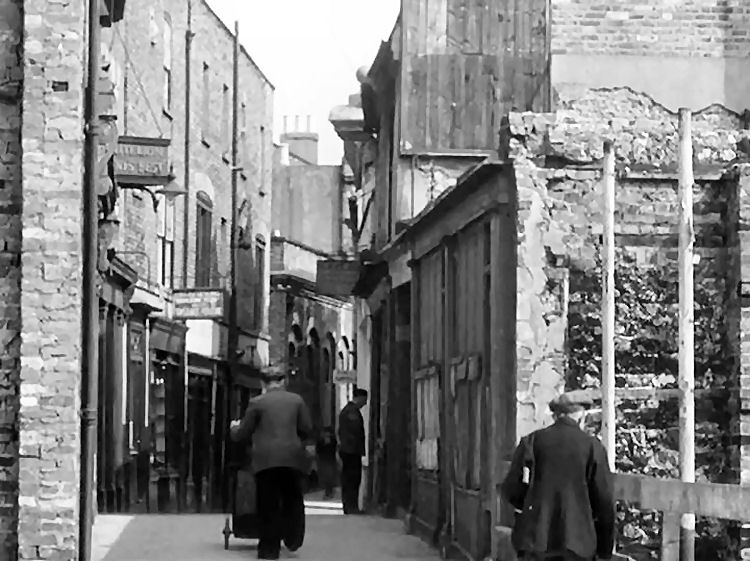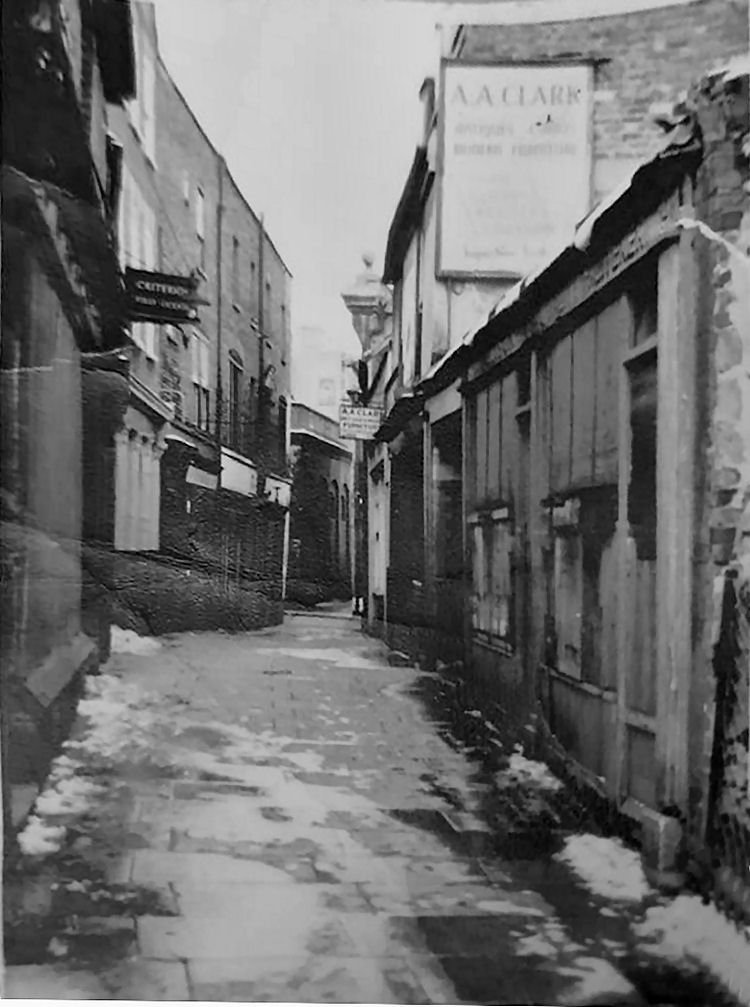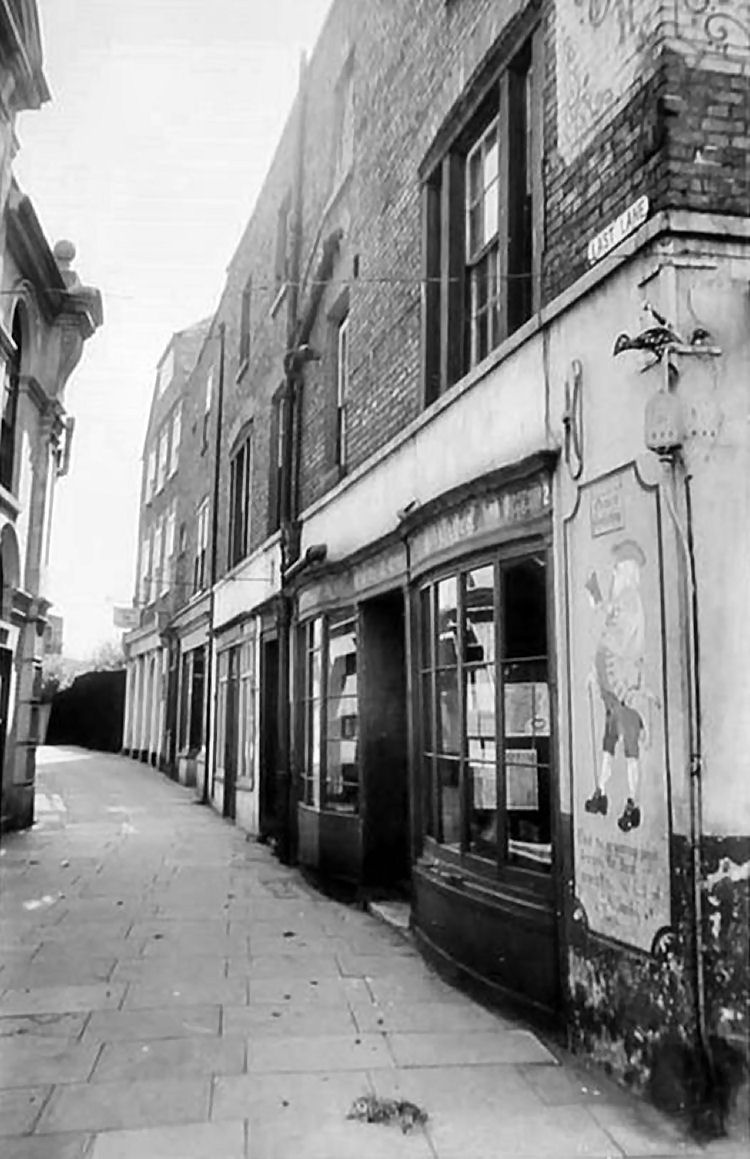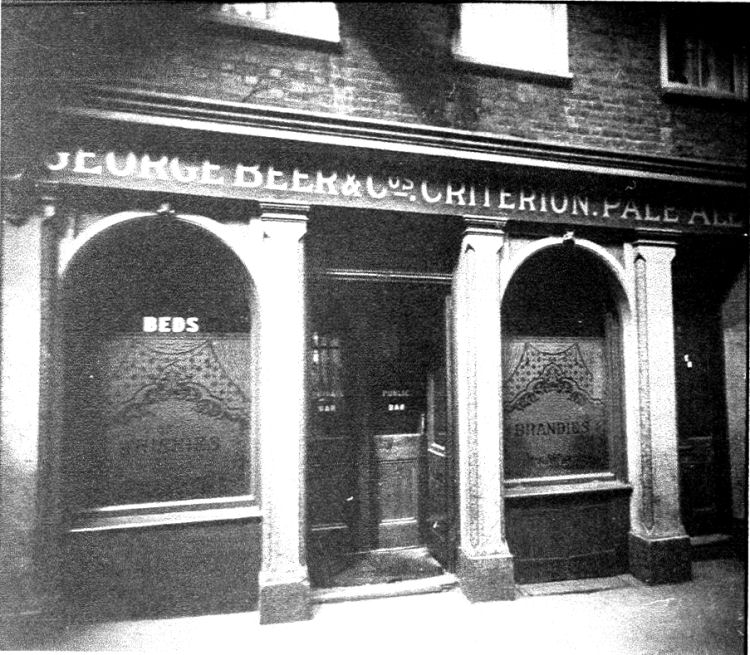|
8 Last Lane (Bourman's Lane)
Dover
An outlet of George Beer and Rigden which finally settled for this title
after previously being the "American Stores", "Who'd a' Thought It" and
"Oxford Music Hall". Also present in the lane up to 1776, and possibly the
same, "The Lass". The sign "Criterion" appeared
between 1880 and 1882 and continued with that name till October 1968.

Above photo showing Last Lane, circa 1950s. Kindly sent by Terence
Clear.
|

Above photo, circa 1950. From Andy Clipson. |

Above photo, 1962, kindly sent by Paul Wells. List of shops are as
follows:-
1 Archie Groves fried chip shop
2 Charles Orme bookseller
3 Payne hairdressers
4 Shotton general dealer
5 Arthur A Clark antiques dealer
6 Nicholls boot repairer
8 Criterion Public House |
|
From the Dover Express and East Kent News, Friday 14 February, 1890.
FAILURE OF A BETTING MAN
At the Canterbury Bankruptcy Court on Friday last, before Mr. Registra
Furley, Frank E. Newstead, licensed victualler, Dover, came up for
examination.
The debts were £946, deficiency £640. The debtor in answer to Mr. Mowll,
Official Receiver, said he commenced business with a capital of £600,
none of which he had paid back. Mr. Marley, from whom he borrowed, had
transacted betting commissions for him. He attributed his failure to
false representation made of the trade of the “Criterion” before he took
it. He went to Doncaster and bet there, losing about £200 or £300. He
never acted as agent for Mr. Marley. He backed horses, but made no
books, only “punted.” Mr. Mowll said betting was a complicated business,
which to their innocent minds was a difficulty to understand. Debtor
answered several questions about Mr. Marley in a curious way, the
Registrar saying he did not believe a word of this part of the story,
Mr. Mowll fully endorsing this. Debtor further said that since 1882 he
had been carrying on this betting business. He should say £2,000 or
£3,000 or under £5,000 passed through his hands in 1888. he went to the
bad in 1889. He was in the army as a private in the 6th Dragoon Guards,
and left in 1885 or 1886 after eight years' service. He was transferred
to the Reserve and bought his discharge. His right name was Frank Euston
Crick, but he enlisted as E. Newstead, as that was the name the
Recruiting Sergeant thought he gave him. There was nothing he wished to
hide about it. The piano which was at the “Criterion” was moved away in
December to Mr. Saville, a tobacconist, as part discharge of his debt.
This was at his (debtor's) suggestion. After a most exhaustive enquiry
as to betting transactions, the case was adjourned for three weeks.
|
|
From the Dover Express and East Kent News, Friday 7 March, 1890.
A DOVER BANKRUPT
Frank Newstead, until recently the landlord of the “Criterion,” Last
Lane, came up for examination before the Registrar at Canterbury on
Friday. He was unable to produce any accounts. He said that when he
received money, he put it in his pockets, and went out and spent it. He
is to file as good an account as he can.
|
A fire starting from the cellar, on 20 January 1890, did not destroy the
house completely but the contents of the bar parlour were written off and
two men had to be rescued from the upper rooms. Frank Newstead faced
bankruptcy as a result.
|
From the Dover Express and East Kent News, Friday, 24 January, 1890. Price
1d.
FIRE AT THE CRITERION
On Monday morning about 3 o'clock, a fire occurred at the “Criterion,”
public-house, Last Lane. The outbreak originated in the cellar amongst
some firewood, into which it is supposed a match was dropped by
accident. The fire was drawn by the air up the passage and stairs, and
when the alarm was given, two men who were in the upper rooms were
unable to get down. P.C. Davis Cook who was in charge of the fire
escape, immediately brought it round, and the two men got on the roof
and descended. The hose reel was brought into play within a few minutes,
and in about an hour the fire was completely extinguished. Considerable
damage was done to the premises, especially the passages and staircase.
|
|
From the Dover Express and East Kent News, Friday, 6 March, 1890. Price 1d.
STABBING CASE
Leonard Johnson, a seaman on board the “Vingolf,” was charged with
stabbing William Hammond, with a knife in Union Street.
In reply to the charge, the prisoner said he never had a knife.
Matthew Hammond said he was a seaman on board H.M.S. Imperieuse, now on
the China Station. He was at home on furlough, staying at 14, Paradise
Place. He said: Yesterday afternoon, I was out with a comrade named
Abbott at the “Phoenix Music Hall.” I left there at ten, stopped at the
“Criterion” till eleven, and then was going home. I saw a crowd at York
Passage, I passed down the passage into Union Street, some sailors came
down the passage just after us and passed me in Union Street, appearing
to be going on board their ship, with the crown following them. They
turned on the crowd, and there was a cry “they have got their knives
out.” I took no notice, as I was walking along the pavement and did not
suppose they would interfere with us, my companion cried “look out” and
dodged, and I felt the knife going up my shoulder. I looked round and
saw Johnson with the knife in his hand. I called my companion away and
said I was stabbed. The Police hearing that I was stabbed asked me if I
could pick out the man whom I was with the knife. They brought three
men, and I picked out Johnson. I came to the Police Station with the
Constable, and then went to the hospital to have my wound dressed. They
would not dress it, and I went to the Police Surgeon's, but as he was
not home I had my wound dressed by Dr. Wood, at the Police Station.
In reply to the prisoner: I am sure this was the man who stabbed me. He
was the only man near to me with a knife in his hand.
Charles Abbot, a coal porter for the London, Chatham and Dover Company,
said that in passing the sailors in Union Street, he saw a crowd and two
Policeman there. The sailors who were Norwegians passed us, and were
going towards their ship. The sailors were not making much noise; it was
the crowd behind them. The sailors turned round on the crowd and
followed the crowd right up to the “Barley Mow.” Somebody shouted “look
out they have got their knives.” I said to my companion “look up,” and
slewed round, and I saw the prisoner strike the last witness with a
knife. It was a sheath knife which they wear in their belts. I saw the
gleam of the knife in the gas light. I tried to throw the prisoner, but
he was too quick for me. He ran aboard the ship. Hammond said he would
not inform on the man who stabbed him, but a gentleman in the crowd said
“If you do not tell, I shall have the man arrested.” The prisoner was
then picked out, and he was brought forward, having a marlinspike in his
hand, with a strap attached to it curled around his wrist. He would not
come forward when called, so we closed on him. We all three fell over an
anchor, and I managed to get the marlinspike off his wrist while we were
on the ground. I am quite sure he is the man.
Police-sergeant Nash said: At a quarter-past eleven on Wednesday
evening, I heard a great noise in Union Street. I went there and saw two
artillerymen walking backwards with their belts in their hands, and
several sailors confronting them, some with knives and some with
marlinspikes in their hands. The prisoner was one of them, and I saw a
knife in his hand. I went between the soldiers and sailors, and said,
“Now, now; what is all this about?” I put my hand on the prisoner's
shoulder, and said, “Put your knife away,” and I said to the others,
“Put your knives all away.” They lowered their knives, but still kept
them in their hands. I asked if anyone had interfered with them, and one
of them replied, “You make these soldiers go away.” I had blown my
whistle, and Police-constables Hughes and Scutt came up. We then got the
sailors close to the side of their ship and left them there. Abbott then
told me that a man had been stabbed. We then turned towards the ship,
when we met the prisoner and two others coming towards Union Street. The
prisoner had the marlinspike in his hand. Abbott identified the prisoner
as the man who stabbed Hammond, and we arrested him, falling over some
anchors doing it.
Police-constable Scott said: I saw the prisoner apprehended. Just before
he was taken into custody I saw another foreign sailor take the sheath
knife out of the prisoner's hand, and I took it from the sailor's hand.
Dr. Charles Wood said he was called to the Police Station, at 12.30, to
see the sailor Hammond. He had a clean cut wound in his back about an
inch and a quarter long, on the right side of his back, below the
shoulder, and about a third of an inch deep. Only the skin and muscles
had been pierced. His clothes had corresponding cuts opposite the wound.
There is n o element of danger.
The prisoner having been cautioned, said: I went on board intending to
go to sleep, and after turning in I heard a noise on the quay. We went
up to see, what the noise was for and I took the marlinspike with me.
One of the other sailors had the knife and went on shore first. We went
up towards the soldiers. The soldiers went away, and in going towards
the ship, I fell over an anchor, and the Police took hold of me because
I had the marlinspike in my hand.
The prisoner was committed for trial at the Quarter Sessions in April.
|
|
From the Dover Express and East Kent News, Friday, 11 July, 1890. Price 1d.
PUBLIC HOUSE CHANGES
Mr. Thomas Golding was granted permission to draw at the “Criterion.”
|
|
From the Dover Express and East Kent News, Friday 25 January, 1895. Price 1d.
PUBLIC HOUSE PROSECUTION
Thomas Goulding, landlord of the “Criterion” public-house, Last Lane,
was summonsed for keeping his house open during prohibited hours – to
wit, 35 minutes pas 11 of 5th January last, and Charles Johnson and
William Spratt, were summoned for being on the premises after prohibited
hours.
Johnson did not appear.
Mr. E. W. Knocker appeared for the prosecution on behalf of the police;
and Mr. M. Mowll appeared for the defendant who pleaded “Not Guilty.”
Police-constable Riley said: I was on duty in Last Lane on Saturday the
5th inst., about 11.30, and I met P.C. Groombridge close to the door of
the “Criterion.” I found the door wide open and we both went in. While
we were standing outside we heard someone talking inside, and we found
the landlord, Spratt, and a man named Johnson in front of the bar, and
the landlady behind. I asked Spratt and Johnson what there were doing
there, and they said they were there as the landlord's friends. There
were three glasses containing liquor on the counter in front of the
three defendant's, and several empty glasses. The landlady said without
my asking that there had been no liquor drawn since eleven o'clock. I
asked Spratt and Johnson for their names, and they gave them.
Mr. Mowll addressed the Bench for the defence, and said the Magistrates,
after hearing the evidence put before them by him, would come to the
conclusion that the licensing laws had not been infringed.
He called, Thomas Goulding, who said: I keep the “Criterion”
public-house, Last Lane. I have kept the house six years, and there has
been no complaints against the house. On Saturday 5th January I turned
everyone out at ten minutes past eleven. I had been playing billiards up
till closing time with Mr. Todd, the Excise Officer. My wife called in a
neighbour, Mrs. Johnson, to see the baby who was ill, and they went
upstairs together. After she had gone upstairs I stood by the door
waiting for Mr. Johnson, and I stopped him and told him his wife was
inside. He stood in the doorway taking, and while we were there Mr.
Spratt cam up and joined in the conversation. As it was a cold night we
went inside until Johnson's wife was ready, the door being left wide
open. Neither Spratt not Johnson had anything to drink in my house.
The Bench after some deliberation, decided to dismiss the case.
|
|
Dover Express 03 September 1926.
FIRE AT PUBLIC-HOUSE.
On Monday morning, about 11, a fire broke out at the "Criterion"
public-house, Last Lane. The hose reel from Queen Street, in charge of
several firemen, was taken there, but not used. The fire was found to be
in the rafters of the roof of the back room, a single storey. The
burning portion was cut away and the fire extinguished with buckets of
water, the premises being left safe at noon. The fire was due to a
quantity of paper being burnt against the wall of the house next door,
the flames going up the wall and catching the roof.
|
|
Dover Express, Friday 10 February 1933.
Dover Brewster sessions.
Inspector Leeming, in regard to the "Criterion," said that 10 visits showed
a total of 20 customers. The present licensee was manager, and there had
been five changes since 1928.
Mr. Jennings said that it was really five changes since 1908. Two of the
changes have been due to ill health. It was a good house, and one they
desired to retain. For the last 10 years they had spent £80 a year on it.
The figures of trade done showed that from 269 barrels and 110 gallons of
whisky in 1926 it dropped to 144 barrels and 50 gallons in 1931, and 89
barrels and 173 gallons of spirits last year. The increase in the
consumption of spirits was in accordance with the experience of all their
other houses - that as the tax on beer increase the sales dropped, and that
of spirits increased. The trade of the house had been affected by the
changes, and they had placed the manager there to get it right again before
letting it again.
Mr. Mowll said that if the Magistrates could not see from the figures that
there was a living from the two houses he would be surprised. It was
unfortunate that they should both belong to the same firm, and it would be
surprising if there were not other houses in Dover doing less trade than
these. In regards to the "Star," what was the position of the licensee?
There was the announcement that the conviction against the last tenant was
not to count against the house, and upon that the new licensee put down his
money and went in. They had hardly got in when he received a notice that the
house was not required. This famous house should not be closed because it
was not doing quite the trade it used to.
In regard to the "Criterion," it has suffered somewhat in the last few
years from changes, but it was very much desired that it should be
continued. Of course, they had nothing to do with the beer tax, but if Mr.
Jennings' diagnosis was correct, it was regrettable, for it was very much
better that the public should drink beer rather than spirits. But the beer
tax was only part of the emergency measures that the government felt obliged
to impose to meet the national crisis, and he suggested that it would be
very wrong to seize upon the moment when the trade of a house was bad
because of the emergency legislation to say that was the time to sweep away
the licence and to pay compensation on a lower basis because of reduced
trade.
The Magistrates, after some discussion, voted by means of a sheet of paper,
and the announcement was made that both houses ("Star") would be referred.
|
|
Dover Express 5th July 1946.
TOWN, PORT & GARRISON.
There will be a reunion for the P.W.V. 1st Bn South Lancs Regt. at the
“Criterion” on 18th July. |
A redundancy charge was evaded in 1933 and it survived then to 25 October
1968 when it closed and was ready for demolition. Tom Byrne moved to keep
the "Invicta".

Above photograph showing the back bar of the Criterion. Kindly supplied
by Chris Byrne, landlord Tom's son. |
Demolition was authorised, together with the "Prince Louis"
nearby, by the Ministry of Transport, in June 1970. The house vanished in
November.
LICENSEE LIST
SMITH Henry 1882

NEWSTEAD Frank Euston 1890

GOLDING Thomas July/1890-95+
(age 33 in 1891 ) )
  
FRIEND Mrs (Richard) 1899

FRIEND Jane E Mrs 1901-Oct/04
 (widow age 60 in 1901
(widow age 60 in 1901 ) )
   
 HOOKWAY William Thomas S Oct/1904+
HOOKWAY William Thomas S Oct/1904+

WHITE/WRIGHT W Henry to Aug/1906

ARKLEY/ARCHIE T W Aug/1906-09
 
BARTON Frank 1908-28 end (age 35 in 1911 ) )
   
LAZELLE Alfred B 1928-Feb/29

 McDONALD William Feb/1929+
McDONALD William Feb/1929+
 (Former
manager of "Royal Hippodrome.") (Former
manager of "Royal Hippodrome.")
NOAKES Albert Stanton 1930-Mar/31
 
PEALL/PEEL Alfred Horace Mar/1931-32+
  (Of Holloway)
(Of Holloway)
MACKAY Albert E 1934-39+ (age 49 in 1939)
 
BYRNE William 1948-59
   
BYRNE Thomas 1964-66 
 From the Post Office Directory 1882 From the Post Office Directory 1882
 From the Post Office Directory 1891 From the Post Office Directory 1891
 From Pikes Dover Blue Book 1895 From Pikes Dover Blue Book 1895
 From the Kelly's Directory 1899 From the Kelly's Directory 1899
 From the Post Office Directory 1901 From the Post Office Directory 1901
 From the Post Office Directory 1903 From the Post Office Directory 1903
 From the Kelly's Directory 1903 From the Kelly's Directory 1903
 From Pikes Dover Blue Book 1909 From Pikes Dover Blue Book 1909
 From the Post Office Directory 1913 From the Post Office Directory 1913
 From the Post Office Directory 1922 From the Post Office Directory 1922
 From Pikes Dover Blue Book 1923 From Pikes Dover Blue Book 1923
 From Pikes Dover Blue Book 1924 From Pikes Dover Blue Book 1924
 From the Post Office Directory 1930 From the Post Office Directory 1930
 From Pikes Dover Blue Book 1932-33 From Pikes Dover Blue Book 1932-33
 From the Post Office Directory 1938 From the Post Office Directory 1938
 From Pikes Dover Blue Book 1938-39 From Pikes Dover Blue Book 1938-39
 From Pikes Dover Blue Book 1948-49 From Pikes Dover Blue Book 1948-49
 From the Kelly's Directory 1950 From the Kelly's Directory 1950
 From the Kelly's Directory 1953 From the Kelly's Directory 1953
 From the Kelly's Directory 1956 From the Kelly's Directory 1956
 From the Dover Express From the Dover Express
 Census Census
|




